Technologies
Pixel Fold: All the Buzz on Google’s Foldable Phone
One of Google’s most anticipated phones could be revealed in May.
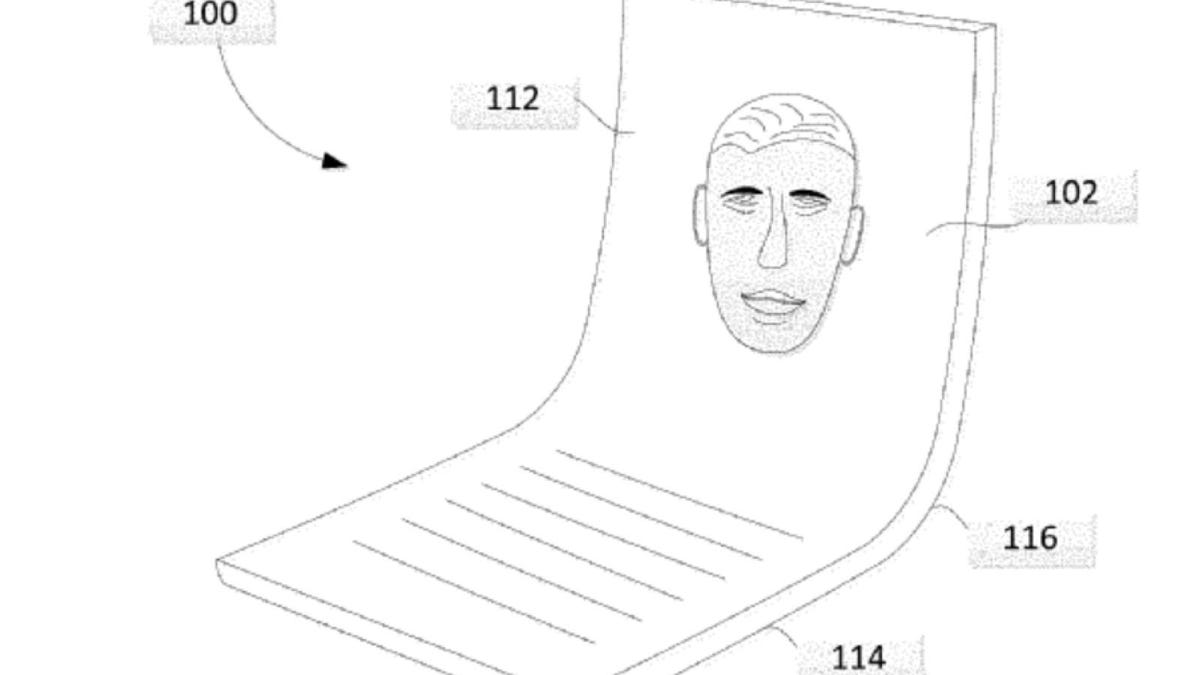
Google could be the next major tech company to throw its hat into the foldable ring. There have been rumors fluttering for a while that a bendy Pixel phone might see the light of day, especially given the company’s focus on hardware in recent years.
The rumored Google Pixel Fold is expected to go on sale in June, according to March reports from 9to5Google and WinFuture. It’s possible the company introduces the Pixel Fold at its annual Google I/O event, scheduled this year for May 10.
So far the company has kept mum on the possibility of a foldable phone. But that hasn’t stopped Pixel fans from hoping. Keep in mind that Google confirmed that it had been prototyping the folding technology back in 2019. Prior to that, it filed a patent application for a foldable device.
Google isn’t the only company that’s reportedly joining the foldable phone bandwagon. It appears to be an open secret that Apple’s gearing up to do the same, though that may not show up till 2025. (Read CNET’s coverage about a potential iPhone Flip.) Samsung meanwhile, seems to be going full steam ahead with its foldable phones. The South Korean company launched its fourth generation of foldable phones, the Galaxy Z Fold 4 and Galaxy Z Flip 4, at its Unpacked event in August. Chinese phone makers like Huawei and Oppo have also continued to release their own foldables in the form of the Mate X3 and the Find N2 Flip.
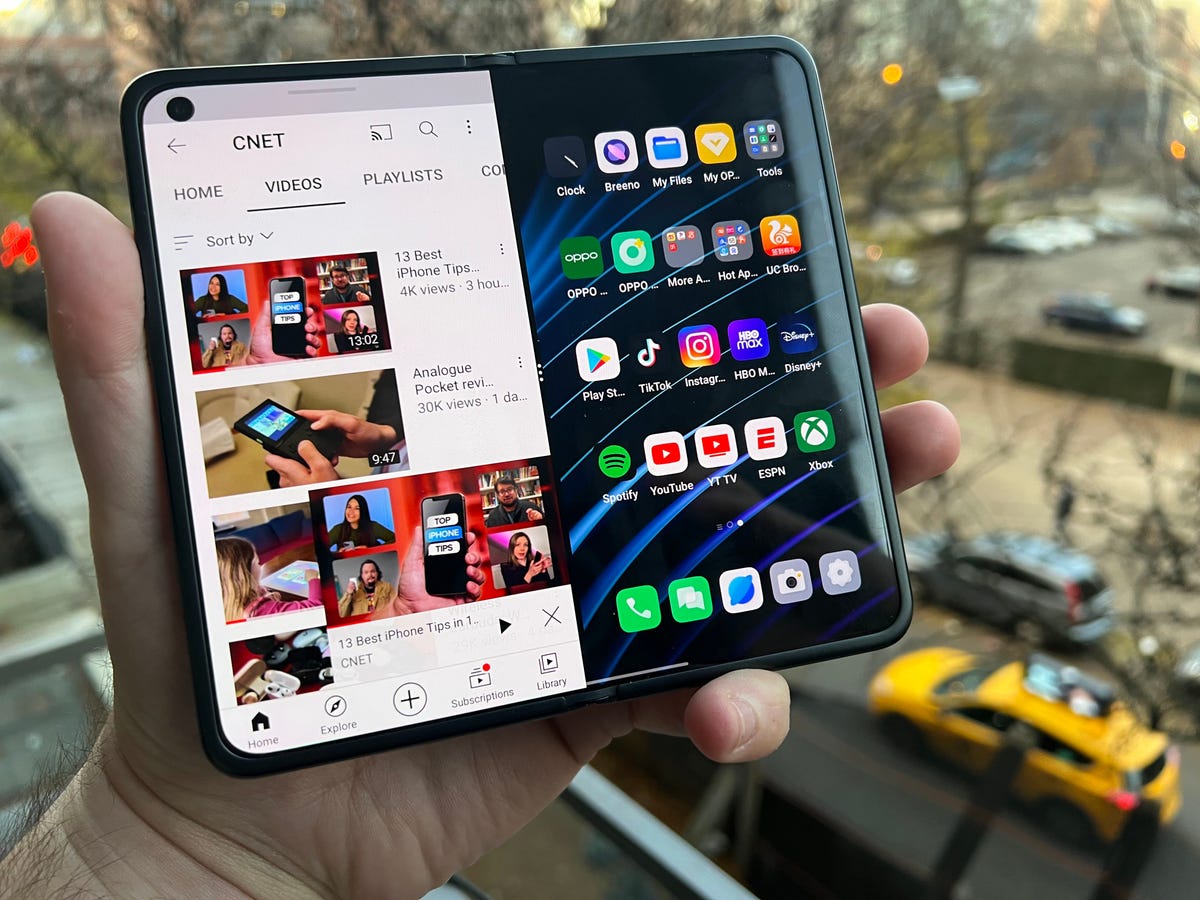

Even when the phone’s opened, it’s hard to find a crease on the Oppo Find N.
Eli Blumenthal/CNETPixel Fold design: More Oppo Find N than Galaxy Z Fold 4
Animations found in Android 12L, Google’s software designed specifically for large-screen devices such as tablets and foldable phones, have offered hints at the possible appearance of the Pixel Fold. Based on that, Google’s foldable phone will take the form of a book-style foldable with two screens.
The Google foldable was initially rumored to resemble the taller and leaner design of Samsung’s Galaxy Z Fold 3, which has an approximate aspect ratio of 22.5:18. But according to 9to5Google and other media outlets, the opened-up Pixel Fold is more likely to resemble the squarish shape of Oppo’s foldable phone, the Find N. When closed, it’s believed to have an aspect ratio closer to 18:9. If that’s true, it would mean that, like the Find N, the Pixel Fold could be more natural to use as a regular phone when closed. According to a December report by HowISolve, the cover display will measure 5.79 inches, while the inner display will measure 7.69 inches.
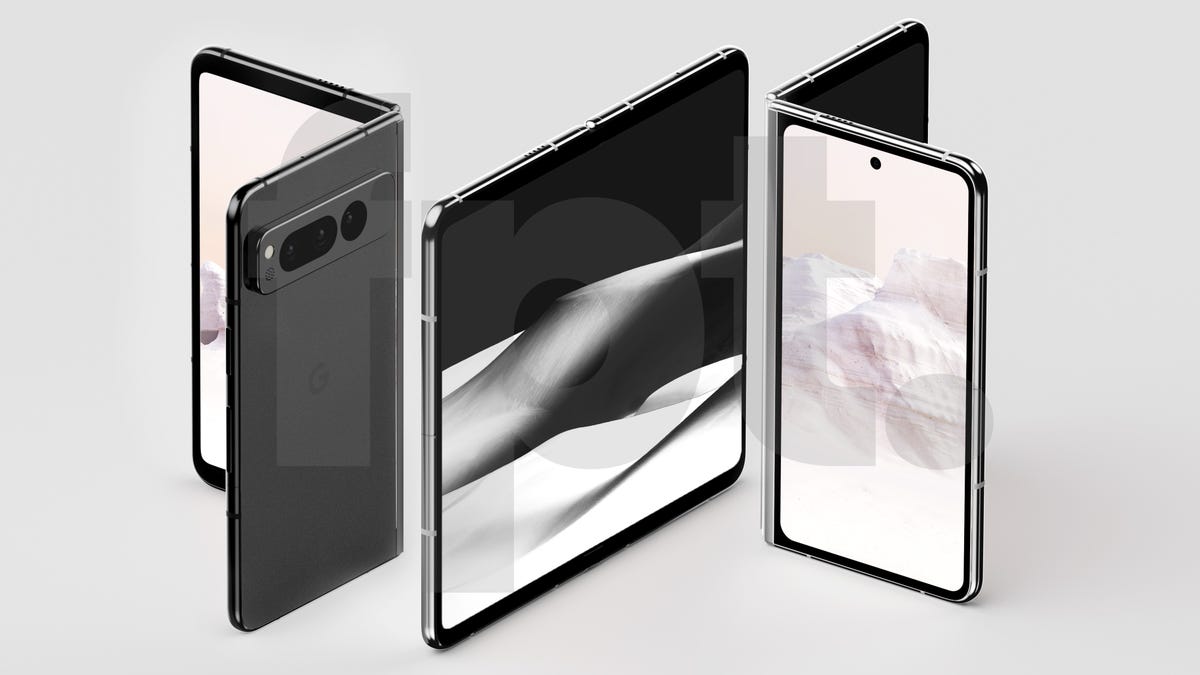

Google Pixel Fold Renders Showing Different Fold Angles
Front Page TechPixel Fold design: Just 2 colors
Renders based on images of a Google Pixel Fold were published online in November by Front Page Tech. The phone renders show two colors, one model in obsidian (black) and one in chalk (white). However more recent reports point to color options in «carbon,» likely a shade of gray or black, and «porcelain.»
Pixel Fold camera: Camera module may be step down from Pixel 6
There haven’t been many rumors about the Pixel Fold’s camera, but there’s room for some speculation, courtesy of 9to5Google. The website is reporting that the Pixel Fold will have two front-facing 8-megapixel lenses, one presumably on the cover and one for the interiors, as well as a 12-megapixel rear camera. The main sensor is expected to be a step down from the Pixel 6 series, since it’s rumored to rely on Sony’s IMX363 sensor, used in the Pixel 3 in 2018, as opposed to Samsung’s top-of-the-line GN1 sensor, from the main 50-megapixel camera of the Pixel 6 series.
If I had to guess, I’d expect the logic for this potential decision to hinge on the size of the GN1 sensor, which is one of the larger camera sensors on the market. That means it’ll be tough for a foldable phone to carry it without increasing the overall heft of an already-hefty foldable device. Another rumor points to the Pixel Fold having a 50-megapixel main camera along with two 12-megapixel cameras and an 8-megapixel one.
Read more: Google Pixel 6A: The Best Android Phone Under $500
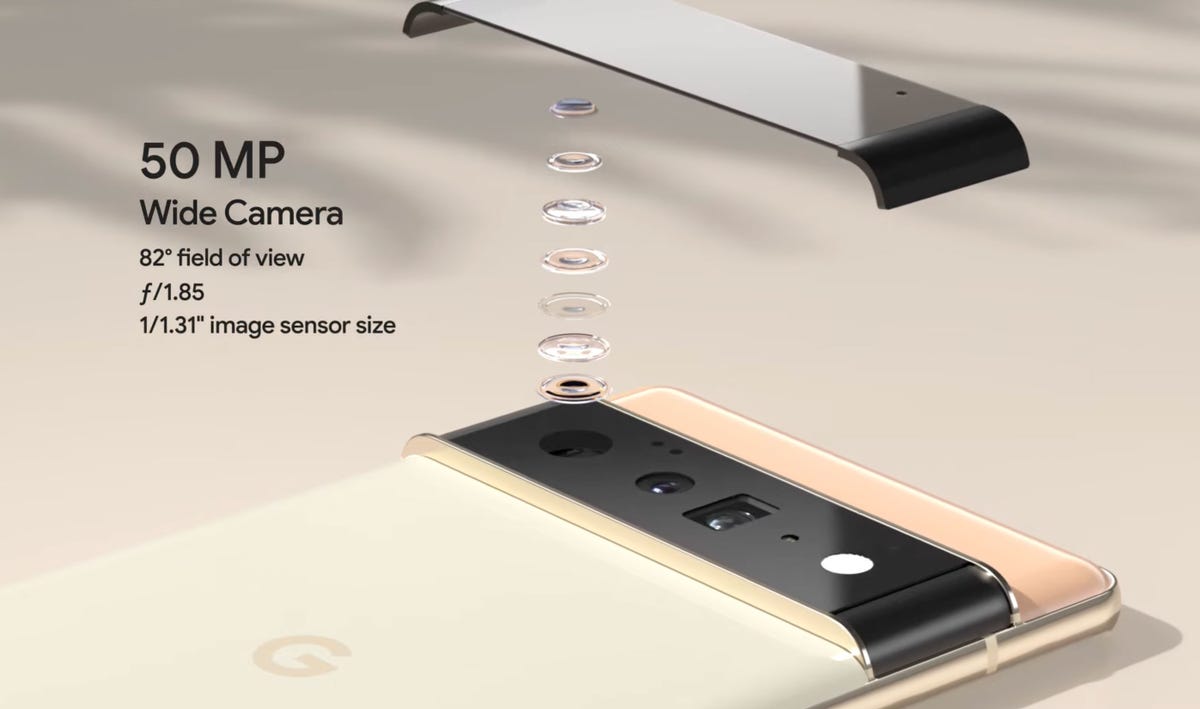

Google put a relatively large image sensor into the main camera of both its $599 Pixel 6 and $899 Pixel 6 Pro.
Google; Screenshot by Stephen Shankland/CNETPixel Fold price: $1,400 to $1,800
There’s no telling for certain what a phone will cost until launch day — if that happens at all. But according to a report by 9to5Google citing an unnamed source, the Pixel Fold will be priced below the $1,800 (£1,320 or AU$2,500) mark. Another report spotted by BGR in March seems to corroborate that notion, putting the price as low as $1,399, which is less than Samsung’s $1,800 Galaxy Z Fold 4. Those rumors seem to make sense as they appear to align with Google’s strategy of undercutting its competitors in terms of price.
Read More: Google Pixel 7 vs. Apple iPhone 14 vs. Samsung Galaxy S22: The $200 Difference
Pixel Fold processor: Tensor
Considering Google went to the complex and costly trouble of developing its own system-on-chip technology, it’s all but certain the Pixel Fold will run on the Tensor chipset, which debuted on the Pixel 6 series.
Technologies
Today’s Wordle Hints, Answer and Help for Jan. 13, #1669
Here are hints and the answer for today’s Wordle for Jan. 13, No. 1,669.
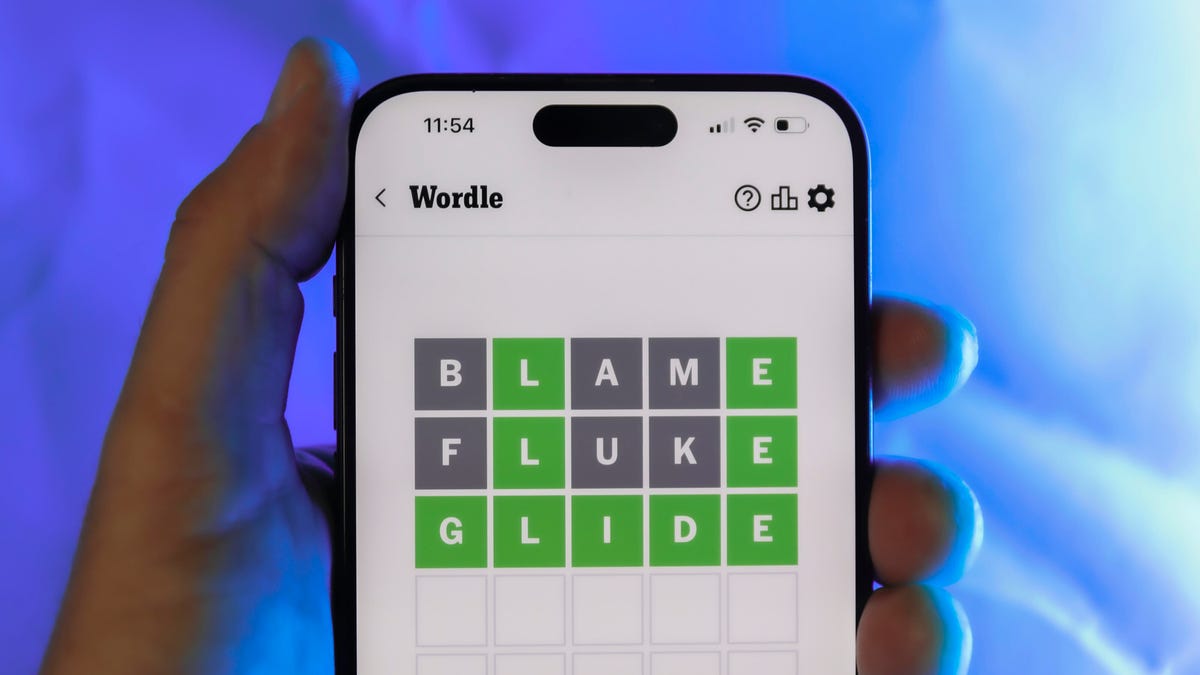
Looking for the most recent Wordle answer? Click here for today’s Wordle hints, as well as our daily answers and hints for The New York Times Mini Crossword, Connections, Connections: Sports Edition and Strands puzzles.
Today’s Wordle puzzle is a little tricky, and it might make you hungry. If you need a new starter word, check out our list of which letters show up the most in English words. If you need hints and the answer, read on.
Read more: New Study Reveals Wordle’s Top 10 Toughest Words of 2025
Today’s Wordle hints
Before we show you today’s Wordle answer, we’ll give you some hints. If you don’t want a spoiler, look away now.
Wordle hint No. 1: Repeats
Today’s Wordle answer has no repeated letters.
Wordle hint No. 2: Vowels
Today’s Wordle answer has two vowels.
Wordle hint No. 3: First letter
Today’s Wordle answer begins with G.
Wordle hint No. 4: Last letter
Today’s Wordle answer ends with O.
Wordle hint No. 5: Meaning
Today’s Wordle answer can refer to a spicy Cajun stew popular in New Orleans.
TODAY’S WORDLE ANSWER
Today’s Wordle answer is GUMBO.
Yesterday’s Wordle answer
Yesterday’s Wordle answer, Jan. 12, No. 1,668 was TRIAL.
Recent Wordle answers
Jan. 8, No. 1,664: BLAST
Jan. 9, No. 1,665: EIGHT
Jan. 10, No. 1,666: MANIC
Jan. 11, No. 1,667: QUARK
Don’t miss any of our unbiased tech content and lab-based reviews. Add CNET as a preferred Google source.
What’s the best Wordle starting word?
Don’t be afraid to use our tip sheet ranking all the letters in the alphabet by frequency of uses. In short, you want starter words that lean heavy on E, A and R, and don’t contain Z, J and Q.
Some solid starter words to try:
ADIEU
TRAIN
CLOSE
STARE
NOISE
Technologies
Today’s NYT Strands Hints, Answers and Help for Jan. 13 #681
Here are hints and answers for the NYT Strands puzzle for Jan. 13, No. 681.
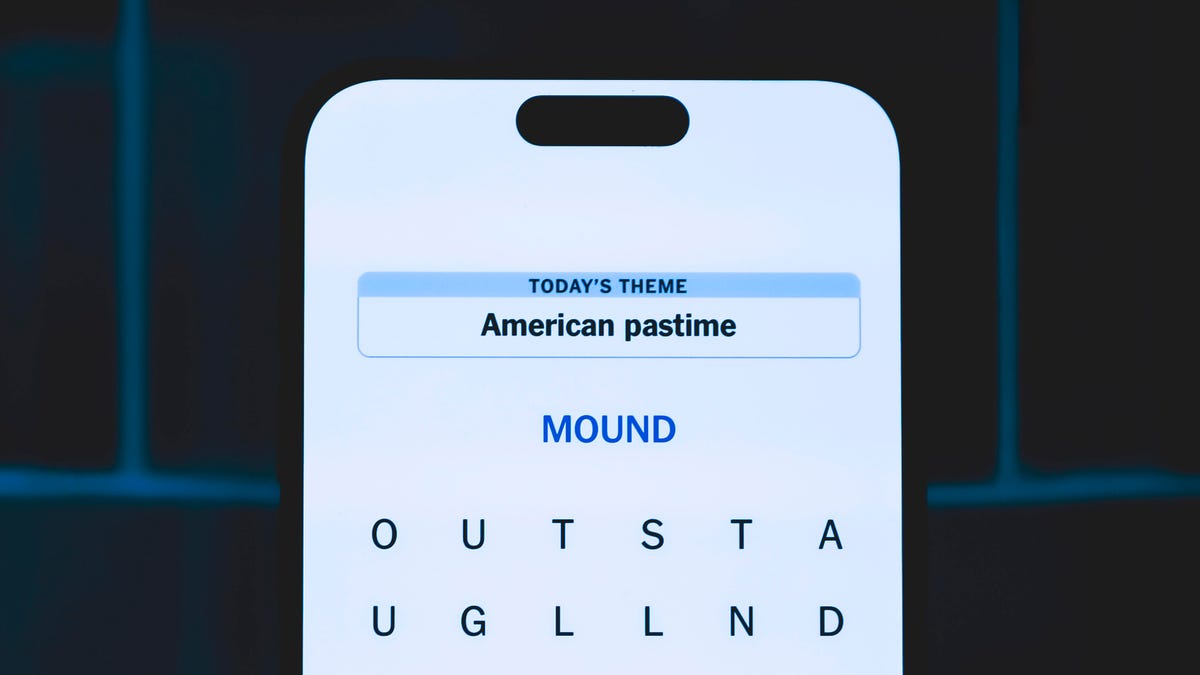
Looking for the most recent Strands answer? Click here for our daily Strands hints, as well as our daily answers and hints for The New York Times Mini Crossword, Wordle, Connections and Connections: Sports Edition puzzles.
It took me a while to figure out the theme for today’s NYT Strands puzzle, but once I did, I thought it was a fun one. Some of the answers are difficult to unscramble, so if you need hints and answers, read on.
I go into depth about the rules for Strands in this story.
If you’re looking for today’s Wordle, Connections and Mini Crossword answers, you can visit CNET’s NYT puzzle hints page.
Read more: NYT Connections Turns 1: These Are the 5 Toughest Puzzles So Far
Hint for today’s Strands puzzle
Today’s Strands theme is: You need to chill
If that doesn’t help you, here’s a clue: Brrrr!
Clue words to unlock in-game hints
Your goal is to find hidden words that fit the puzzle’s theme. If you’re stuck, find any words you can. Every time you find three words of four letters or more, Strands will reveal one of the theme words. These are the words I used to get those hints but any words of four or more letters that you find will work:
- GONE, ABLE, TABLE, FOOD, TEEN, LEAF, GOOF, GOOD, SAFE
Answers for today’s Strands puzzle
These are the answers that tie into the theme. The goal of the puzzle is to find them all, including the spangram, a theme word that reaches from one side of the puzzle to the other. When you have all of them (I originally thought there were always eight but learned that the number can vary), every letter on the board will be used. Here are the nonspangram answers:
- PIZZA, SHERBET, POPSICLES, WAFFLES, VEGETABLES
Today’s Strands spangram
Today’s Strands spangram is FROZENFOOD. To find it, start with the F that is five letters down on the far-right row, and wind backward.
Don’t miss any of our unbiased tech content and lab-based reviews. Add CNET as a preferred Google source.
Toughest Strands puzzles
Here are some of the Strands topics I’ve found to be the toughest.
#1: Dated slang. Maybe you didn’t even use this lingo when it was cool. Toughest word: PHAT.
#2: Thar she blows! I guess marine biologists might ace this one. Toughest word: BALEEN or RIGHT.
#3: Off the hook. Again, it helps to know a lot about sea creatures. Sorry, Charlie. Toughest word: BIGEYE or SKIPJACK.
Technologies
Anker’s Brand New Soundcore Aerofit Pro 2 Earbuds Are Barely a Week Old and They’re Already $30 Off
The AeroFit line has been one of our go-tos, and the brand-new Pro model is already easier to recommend thanks to a solid deal.

If you’re looking for earbuds that can keep up with your workouts, commutes and everything in between, the Anker AeroFit Pro 2 earbuds are worth a look. This brand-new model just launched last week, combining comfort, open-ear listening and active noise cancellation into one versatile package.
We expect big things from this new model — after all, the AeroFit 2 are one of our favorite earbuds, so this new model is bound to impress. Despite being so new, the AeroFit 2 Pro are already discounted to $150, down $30 from the launch price of $180. You’ll need to use promo code WSTDA3875US when you shop at Anker, giving you a head start on a top-tier open-ear experience.
What’s unique about the AeroFit Pro 2 is that the buds can switch between two forms with a simple adjustment of the ear hooks. That means you get both an open-ear design for breathable comfort and active noise cancellation for focused listening. Those same skin-friendly liquid silicone ear hooks ensure a secure fit that should stay comfortable all day.
Hey, did you know? CNET Deals texts are free, easy and save you money.
Sound promises to be equally impressive. The earbuds offer studio-grade 11.8mm composite drivers, LDAC technology and dynamic head tracking deliver immersive, theatre-like audio. Four mics with AI call-boosting make your voice come through crystal-clear, even in noisy environments.
If you want to compare models, take a look at our roundup of the best open earbuds for 2026, and the best headphone deals for more savings.
HEADPHONE DEALS OF THE WEEK
-
$248 (save $152)
-
$170 (save $181)
-
$398 (save $62)
-
$200 (save $250)
Why this deal matters
You have the chance to get a brand-new model from a proven line of favorites at a solid discount. With versatile forms, premium sound and top-notch microphones, the AeroFits Pro 2 is a flexible, high-quality option for any listener.
-

 Technologies3 года ago
Technologies3 года agoTech Companies Need to Be Held Accountable for Security, Experts Say
-

 Technologies3 года ago
Technologies3 года agoBest Handheld Game Console in 2023
-

 Technologies3 года ago
Technologies3 года agoTighten Up Your VR Game With the Best Head Straps for Quest 2
-

 Technologies4 года ago
Technologies4 года agoBlack Friday 2021: The best deals on TVs, headphones, kitchenware, and more
-

 Technologies4 года ago
Technologies4 года agoGoogle to require vaccinations as Silicon Valley rethinks return-to-office policies
-

 Technologies4 года ago
Technologies4 года agoVerum, Wickr and Threema: next generation secured messengers
-

 Technologies4 года ago
Technologies4 года agoOlivia Harlan Dekker for Verum Messenger
-

 Technologies4 года ago
Technologies4 года agoiPhone 13 event: How to watch Apple’s big announcement tomorrow
